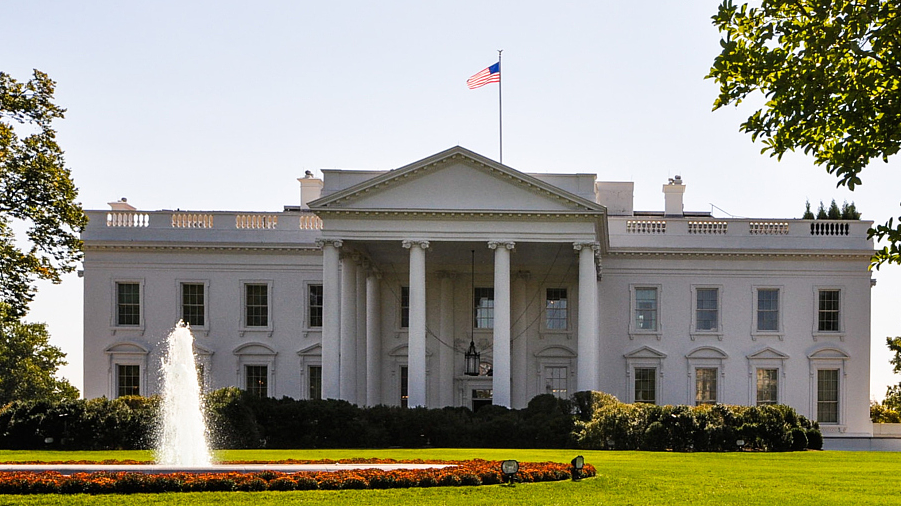
The White House, Washington DC, U.S.
The White House, Washington DC, U.S.
Editor's note: Tom Fowdy is a British political and international relations analyst and a graduate of Durham and Oxford universities. He writes on topics pertaining to China, the DPRK, Britain, and the U.S. The article reflects the author's opinions, and not necessarily the views of CGTN.
On March 5 the United States House of Representatives passed what is termed the "Taiwan Allies International Protection and Enhancement Initiative (TAIPEI) Act of 2019(TAIPEI Act)" – vowing to increase support for the island, give authorization for the Presidency to assess aid for countries if they downgrade their relations with the territory, sell munitions to it and fight for its participation in international organizations.
The bill follows a similar, although not identical version which was passed in the Senate last year, although differences between the two versions would need to be ironed out before it is passed to the White House for signature. Yet again it marks another bipartisan anti-China bill gaining traction in Congress, which has included ones on Xinjiang, Hong Kong and Tibet.
With the ascent of this bill, it is obvious that the United States is eager to drift away from a supposed commitment to the one-China policy and instead towards a stance of supporting Taiwan against the Chinese mainland. Because the one-China policy constitutes a keystone of China's foreign policy, China's stance will remain non-negotiable accordingly and will result in more firm actions by Beijing. This inevitably means that if the United States continues to push the Taiwan issue unfairly, then more disruptions ultimately lie for relations between the two countries.

The night view of Taipei, southeast China's Taiwan, June 20, 2019. /Xinhua Photo
The night view of Taipei, southeast China's Taiwan, June 20, 2019. /Xinhua Photo
In 1979 the United States Congress enacted the "Taiwan Relations Act" – which affirmed a switch in relations from the island's government to the People's Republic of China and thus loosely adopting the one-China policy. While of course significant differences remained from America's position and China's position on the issue from the beginning, nevertheless Washington's position and interests also served to limit the political scope of secessionism on the island and acknowledge the issue had to be resolved.
For many years, this made administrations in the U.S. hesitant of the actions of the Democratic Progressive Party in any potential damage caused to the U.S.-China relations and regional stability. Now however, the game has changed.
Instead of playing a strategically ambiguous, mediating role on the manner of reunification, the United States is now changing its stance and leaning towards an effective support and empowerment of Taipei against China, and thus backtracking on its existing commitments. The signalled change first begun with a phone call between Trump and Tsai Ing-wen as he assumed the Presidency. This was later followed with the "Taiwan travel act" which encouraged official visits in 2018 and open diplomatic protests against countries adopting the one-China policy, including El Salvador and Panama.
The TAPEI Act takes this evolving position further and aims to entrench it into U.S. law on top of the original Taiwan Relations Act. Despite that, the U.S. itself technically upholds the one-China policy, the TAIPEI Act gives legal authorization for the U.S. administration to punish countries who choose to adopt this position and open relations with the Chinese mainland over Taipei, as well as supporting its role in international organizations.
In doing so, the U.S. aims to cause further disruptions in the cross-Strait ties and thus stifle prospects for reunification, than once supporting them albeit with given conditions.
However, the new act will not produce a change from China's position. Beijing specifies clearly that the one China policy, as all issues of national sovereignty and territorial integrity, are non-negotiable. Given that sovereignty does not have legitimacy without red-lines to enforce it, there can be no compromise on this issue.
Undoubtedly, the TAPEI act has the potential to produce a further deterioration in U.S.-China relations on Washington's behest, especially when the core of diplomatic relations between the United States and China was calibrated around the one-China principle, of which they now seem content to disregard and transform into another means to attack Beijing. This bill is yet the latest in what has been a series of moves in this direction, and for sure it won't be the last.
(If you want to contribute and have specific expertise, please contact us at opinions@cgtn.com.)